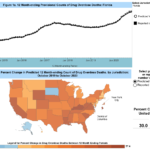Since the start of the COVID-19 pandemic, deaths from drug overdoses dramatically increased throughout the U.S. and states such as Florida have been especially hard hit. According to the latest data from the Centers for Disease Control, Florida accounted for 8% of all fatal overdoses nationwide that occurred from October 2019 thru October 2020. At the end of the 12 month period ending in October 2020, Florida reported 7,422 overdose deaths, representing a 37.5% increase over the 5,397 overdoses reported over the same period ending in October 2019.
Social and economic stressors arising from the pandemic, combined with the disruptions to health care, placed many at greater risk of overdose and death. In person treatment and recovery programs were vastly curtailed in the wake of COVID — including visits with healthcare providers, group counseling sessions, inpatient stays, and 12 step meetings. Thus, there was far less of the emotional support that is vital to addiction treatment and recovery. And with the pandemic disrupting treatment centers and other places that help people with drug addiction, there may have actually been less naloxone available to those most at risk.
These data highlight the urgent need to devote more resources to closing the treatment gap in Florida by identifying and eliminating barriers to access—including those that are COVID-19 specific. Doing so will save many thousands of lives by ensuring that all who are in need will be able to access treatment services of the highest quality.





